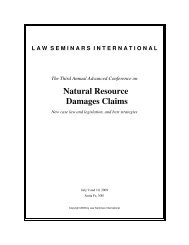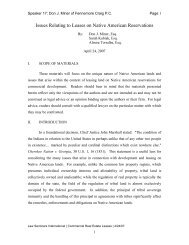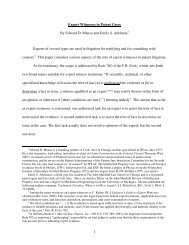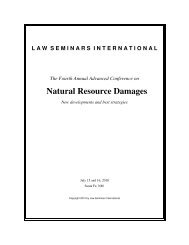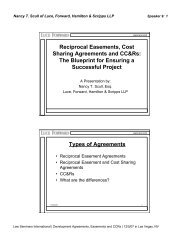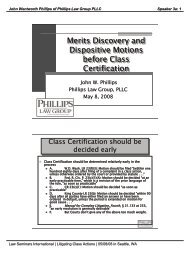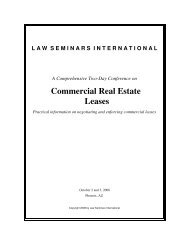LSI 2010 Real Estate Joint Ventures conference materials.pdf
LSI 2010 Real Estate Joint Ventures conference materials.pdf
LSI 2010 Real Estate Joint Ventures conference materials.pdf
Create successful ePaper yourself
Turn your PDF publications into a flip-book with our unique Google optimized e-Paper software.
Donald E. Percival of Davis Wright Tremaine LLP Speaker 27: 2<br />
<strong>Real</strong> estate funds and joint ventures are illiquid, labor-intensive creatures living in<br />
a cyclical market. At the beginning of a venture, it is natural for the prospective partners<br />
to concentrate their discussions on issues relating to the investment purposes of the<br />
venture, the size of their capital commitments, the conditions under which their capital<br />
contributions will be made, the scope of the partner’s rights to participate in major<br />
decisions and the formula by which the participants will share the fruits of their success.<br />
Until recently, prospective partners were not likely to devote as much attention to<br />
defining the future circumstances in which one partner may want to exit the joint venture<br />
or the partners may otherwise want to part company.<br />
Recent events have demonstrated that even the most committed long-term venture<br />
partners must consider the possibility that changing internal or external circumstances<br />
may alter their desire to remain in the venture. As time passes, venture partners may<br />
discover they have different needs for liquidity, different opinions of future market<br />
conditions, different investment priorities and different opportunities. And over time<br />
even the most amicable relationships can cool or turn contentious, particularly where the<br />
venture is unsuccessful and the manager’s or general partner’s right to fees is not tied<br />
solely to the venture’s performance. Prospective partners therefore need to think about<br />
the “endgame” and define the conditions and terms under which partners may exit the<br />
venture in the absence of mutual agreement to dispose of the property and wind up the<br />
venture.<br />
Investors and general partners/managers of property-specific real estate ventures<br />
have traditionally chosen from a wide array of alternative exit strategies with familiar<br />
names and acronyms (ROFO, ROFR, buy-sell, etc.). But there appear to be no common<br />
definitions of many of these terms, no clear consensus concerning the advantages and<br />
disadvantages of different exit strategies and only rarely do new partners fully appreciate<br />
the scope and complexity of the issues posed by each alternative.<br />
Exit devices for fund investors are generally fewer and simpler, but there still is<br />
little consensus concerning what exit strategies are appropriate. Fund investors have<br />
traditionally had little opportunity to require liquidation of all or portion of the fund’s<br />
portfolio, to dissolve the fund or otherwise to demand the return of their capital prior to<br />
expiration of the fund’s life. Although the evaporation of traditional sources of credit and<br />
a dramatic decline in real estate values over the past few years have triggered intense<br />
interest in the creation of new real estate funds and joint ventures to fill a market vacuum<br />
and seize upon pricing opportunities that seemed unlikely only two years ago, large<br />
losses incurred by funds organized by even the most respected and historically successful<br />
fund sponsors have motivated participants to pay greater attention to the ways in which<br />
venture documents can align the interests of investors and managers and give investors<br />
greater say over the liquidation of their interests.<br />
This phenomenon is not limited to real estate. In September 2008, the<br />
Institutional Limited Partners Association (ILPA), a 220-member organization of<br />
institutional investors managing more than $1 trillion of private equity capital, issued a<br />
position paper titled “Private Equity Principles,” in which the ILPA recommended a set<br />
of “best practices” for the private equity industry intended to align the interests of<br />
- 1 -<br />
Law Seminars International | <strong>Real</strong> <strong>Estate</strong> <strong>Joint</strong> <strong>Ventures</strong> and Funds | 02/09/10 in Seattle, WA





